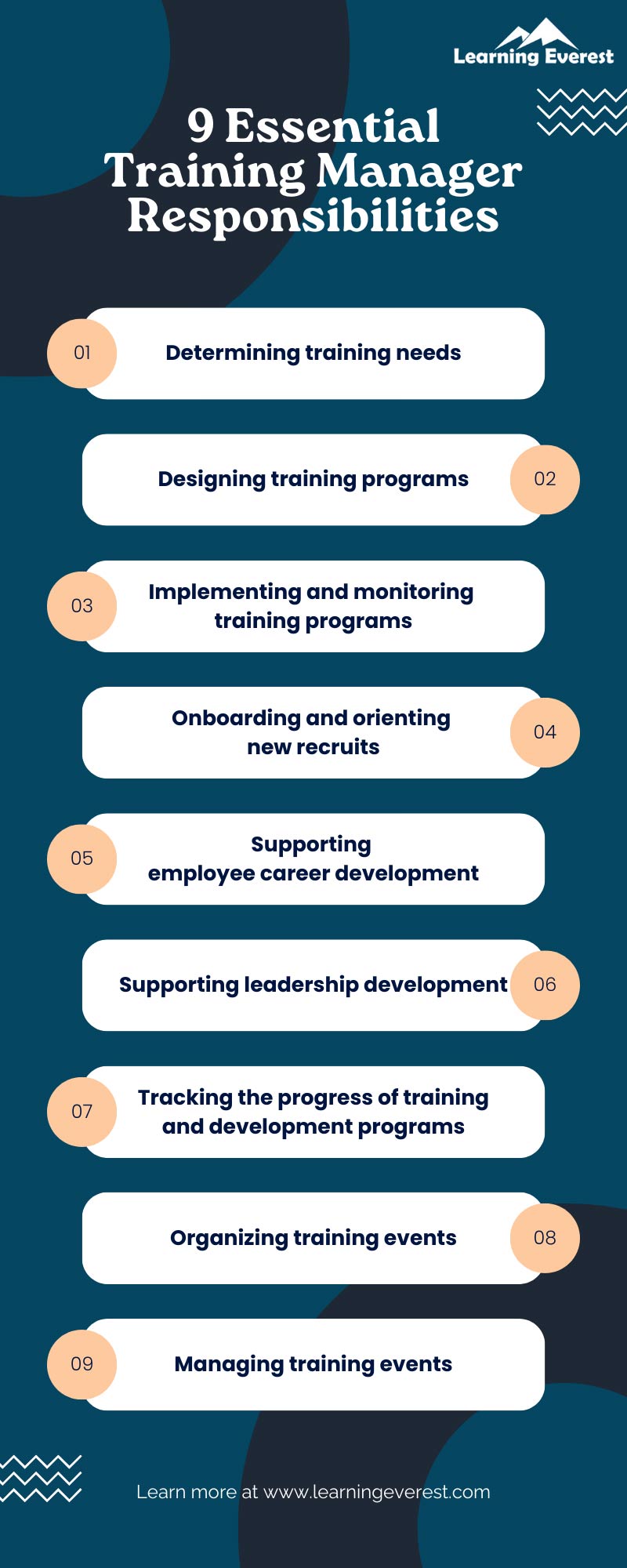Training manager responsibilities span over a wide area of tasks and expertise. A training manager is responsible for everything from designing to implementing training programs in the organization. Using their skill-set and specialized training knowledge, they contribute to organizational learning and development. In this article, you will learn about 9 essential training manager responsibilities to guide your career path or hiring decisions.
Table of Contents
Training Manager Qualifications
Before looking at training manager responsibilities, let us look at the qualifications a training manager is expected to have:
- A bachelor’s degree (minimum)
- Study in fields such as training and development, HR management, business administration, psychology, instructional design, etc.
- Proven work experience in training-related roles
- Additional certification in training management
Here are some essential training manager responsibilities
Training Manager Responsibility #1: Determining Training Needs
One of the most important training manager responsibilities is determining employees’ training needs, especially in the context of organizational goals. A training manager uses various methods and tools to identify knowledge and skills gaps in employees and associate them with their performance of tasks essential to the productivity and success of the organization.
Training Manager Responsibility #2: Designing Training Programs
Training managers have expertise in instructional design, eLearning development, and project management. They use this knowledge and skills to design effective training programs that meet learning objectives and build employees’ competencies to better fulfil their job roles. Training managers are responsible for determining the curriculum in collaboration with SMEs, developing the overall structure of training programs, setting learning objectives, and designing assessments. Additionally, they also design the learning experience, be it visually for an eLearning course or for instructor-led sessions.
Training Manager Responsibility #3: Implementing and Monitoring Training Programs
After the development of training programs, training manager responsibilities shift to their implementation and monitoring. They come up with a strategy for how the training will be delivered to the workforce and then observe learners’ reception of the course. Using this feedback, they can tweak the training strategy to better fit learners’ needs proactively.
Training Manager Responsibility #4: Orienting and Onboarding New Recruits
Training managers are involved in the orientation and onboarding of new recruits or transfers. This might be directly, as a facilitator and contact person, or indirectly, as someone who puts together the orientation program and its training materials. Training managers, are, thus, responsible for ensuring new recruits have a smooth transition into their new jobs and understand their duties and the company’s culture well.
Training Manager Responsibility #5: Supporting Employee Career Development
Training managers are also responsible for supporting and facilitating employees’ career development. This helps with maintaining a competent workforce, as well as retaining employees. After understanding employees’ strengths, weaknesses, and desired career direction, training managers can collaboratively create a career development plan with them that builds relevant expertise. This plan includes training programs, mentoring opportunities, projects, and internal internships, if required.
Training Manager Responsibility #6: Supporting Leadership Development
Apart from supporting employee career development, training managers also support leadership development. In a similar way to employee development programs, they use their training expertise to design, develop, and implement leadership development programs to support greater productivity, increased employee morale, and shape strong and influential leaders in the workplace.
Training Manager Responsibility #7: Tracking the Progress of Training and Development Programs
After training programs have been implemented, training managers are responsible for tracking its progress. They monitor whether the training is following the expected timeline, whether it is having the desired impact on target learners, and whether it is creating meaningful change in the knowledge and behaviors of employees. They do so by observing training sessions and employees on their, collecting survey feedback, and gathering employee data from managers and team leaders.
Training Manager Responsibility #8: Organizing Training Events
As the person in-charge of organizational training and development, training managers are also responsible for planning and organizing training events for the business. These could include workshops, lunches, networking events, or even industry-specific conferences. Training manager responsibilities for organizing events might include getting in touch with speakers, deciding topics for the events, booking venues, creating a budget, etc.
Training Manager Responsibility #9: Managing Training Budget
Lastly, training managers manage the training budget. They need to ensure that organizational training activities take place under the stipulated budget, which entails carrying out negotiations with vendors and learning partners, as well as advocating for a sufficient training budget internally.
Conclusion
Training manager responsibilities span over multiple domains related to training. They are not only responsible for heading organizational L&D, but are also expected to participate in other related activities. Training managers ensure that there is sufficient budget for learning, all training needs are being met well, and that the learning culture in the organization is thriving and is in alignment with the organizational vision and goals.
Infographic
Knowledge Check!
Frequently Asked Questions (FAQs)
What is the job role of a training manager?
A training manager is responsible for everything from designing to implementing training programs in the organization. Using their skill-set and specialized training knowledge, they contribute to organizational learning and development.
Which manager is responsible for training?
Typically, a dedicated training manager is responsible for training.






